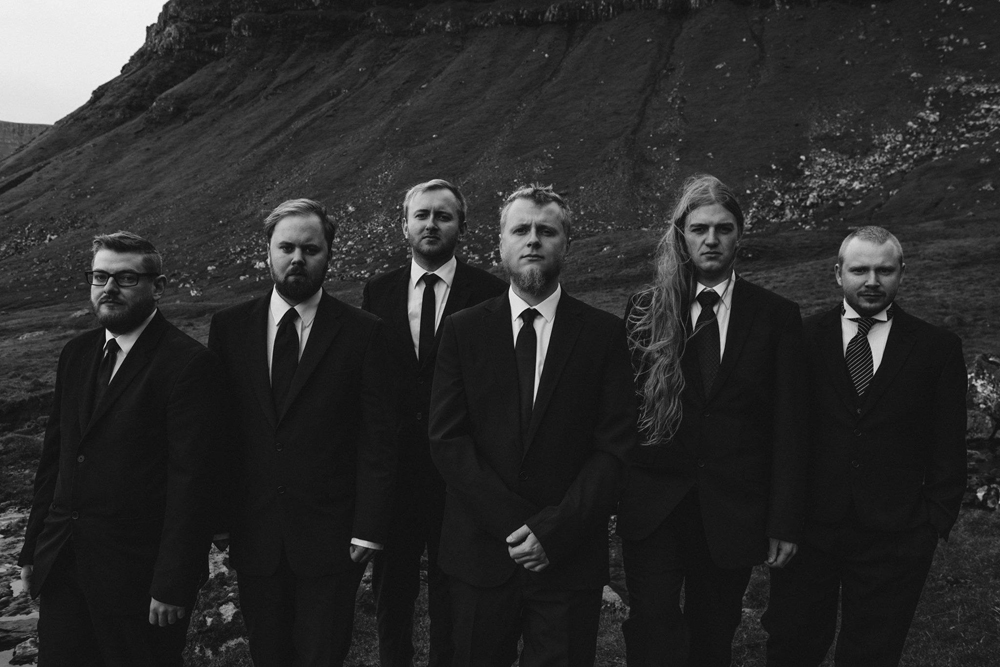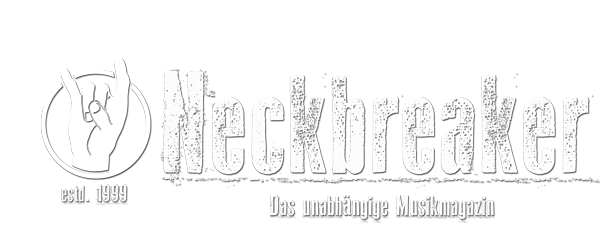As you could have read several times so far, I was crazy enough to fly to Iceland in January for the release concert of AUĐN and HAMFERĐ. At the same time, I got an interview request by HAMFERĐs label. So why not do it in Iceland? As we know each other, I agreed with Theodor that we would try to do a face to face in Iceland. Originally we planned to do it before the concert, in the early Saturday afternoon but the band has been so busy that we didn't make it. But as we all stayed until Monday (except for Remi and Ísak who had to leave on Sunday), we had the possibility to do the interview on Sunday as well. As there were certain difficulties like icy roads (and an icy car, it took me 10 minutes alone to free the car from all the ice), a navigation system that didn't know the road and some oldschool navigation with a map I arrived a bit late. That led to an interview under slightly complicated circumstances, because Theodor and especially Jón had to slip into the kitchen every now and then because they were busy preparing some food (and the meal must not become a victim to the interview!). Nevertheless Jón Alderá, Theodor Kapnas, John Áki Egholm and Esmar Joensen answered my questions readily and sometimes even a bit chaotic. So in the end it didn't feel like a real interview, but more like an ordinary chat.
Anne: You asked me not to ask so many questions but as we do the interview after the concert I have to add one question: How bad is the hangover?
Theodor: It’s ok.
Jón: It’s pretty good. It could be a lot worse.
Theodor: Also, we have an apartment with a bath tub, we have beers in the fridge, so we can take a hot bath and a recovery beer and all is good again.
Anne: Why did you do the release show in Iceland and not on the Faroe Islands or maybe somewhere in Europe where more fans could have attended?
Jón: We’re doing a release show in the Faroes. It’s just… we were pretty late or we weren’t late booking it but we were too late, because there’s so much stuff going on in the Faroes depending on to get the date to fit. So we’re doing that in March actually, we managed to get the venue that we wanted and all the gear. So that’s in March. And we spoke to the AUĐN guys…
Theodor: …a few months ago. They also released their album in November and did their release gig now, because they went straight onto the tour and then did their local release gig after that. I think our thinking is the same. This date just randomly coincided with our release, then we have the European tour in February and then we can do the release show after the tour, when everything is - you know, when we played the stuff like 25 times in a month and then we should be in good shape and…
Esmar: …we do the best show possible.
Anne: What did change for you with being signed by a bigger, international label and why was this step important now and not back in 2012 when you refused the deal with Nuclear Blast?
Theodor: We have always been very careful, we take the band very seriously, and back where we were in 2012 we were still too small a band to really have a saying in negotiations, so we were given a deal and they said sign it or not and there were too many things in that deal which we just could not live with. And I think, I don’t know what would have happened if we had signed that back then. I think it feels like the right timing now. We did first on TUTL a proper European PR and distribution so we did not explode, but we grew a bit and we toured a bit and now it feels like we managed to build the platform and hopefully a bigger fanbase so we can get a little bit more out by signing with the label Metal Blade.
Anne: I’m not going to ask what the album is about because everybody is asking that, but…
Theodor: You can ask Jón later, he’s the one who answers that.
Jón (out of the kitchen): No, no, it’s fine, don’t ask!
Anne: …but did you come up with the story completely yourself or are there some elements of Faroese folklore in there?
Theodor and John: Jón!
Jón (still in the kitchen): You can answer that!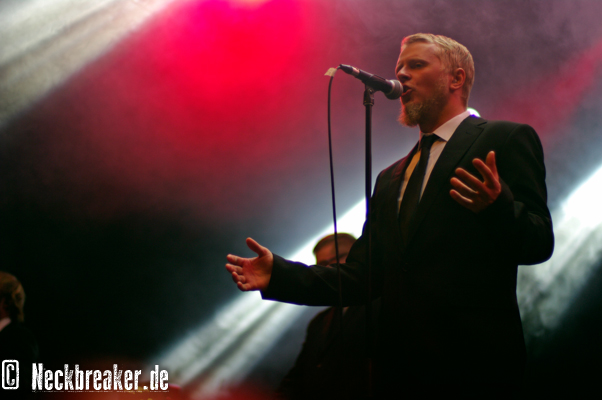
Theodor: No, no, no. It’s a Jón question.
Jón: There is no reason you pass it onto me, you know that very well!
Theodor: Ok. Jón did the story inspired by Faroese folklore, by certain elements of Faroese folklore. Right?
Jón: Yes.
Theodor: I guess that is a short answer.
Jón: I wasn’t directly using some elements from other stories. Is it that what you’re asking?
Anne: Yes.
Jón: No, not particularly, no. It is, as Theodor said, inspired by what we all usually get told when growing up, these kinds of folklore things.
Anne: Did you plan to make a trilogy or did it just turn out like that?
Jón: It just turned out like that, yes. For the first album we made the songs and wrote the lyrics, or I wrote the lyrics to each song and then they all ended up being a little bit about the same thing. But in slightly different ways. So when we put together the first EP and tried to figure out the sequence of the songs we thought we could start with a song which is like a burial song and then a retrospective song, followed by a physical dying song and then a spiritual dying song. So it’s all about a guy who dies and goes through different things.
John (with a dramatic voice from the background): It starts with the end.
Jón: Yes, it starts with the end.
John: And it ends at the beginning.
Jón : It ends with the beginning. (all laugh)
Anne: But back then you didn’t have the further story in mind?
Jón: No. I didn’t have the full story in mind. So it kind of grew, and then “Evst” came, yes…
Theodor: It grew organic.
"It doesn’t really matter if you know exactly what it is about as long as you can follow the emotional journey through it."
Anne: I found it hard to understand without further explanations. Even if you understand a bit of the lyrics, it’s hard to understand the story. Is that a problem for you?
Jón: No, I don’t think so because it wasn’t really… It has been taking up a lot of space in interviews and stuff and now it’s going to be a big thing with this album and the story has inspired all the artwork around it. But actually reading the lyrics and follow the lyrics while listening - even Faroese people won’t be able to gather exactly what’s going on from song to song. It’s more like an introspective within the characters that’s going on and a lot of the details are not even in the lyrics so it’s more like a framework for the story.
Anne: So the story itself isn’t so important?
Jón: No, maybe not. It is a big thing, a good thing to know it while you listen to the album, but I don’t think it really matters to how you respond to the material that much.
Theodor: It’s like a lot of instrumental music – this is obviously not instrumental music but a lot of instrumental music or classical music is based around some sort of feelings and themes and sounds and it tells some sort of story, but nobody really knows what it is and you have to make your own interpretation of it.
Jón: Yes, exactly. It doesn’t really matter if you know exactly what it is about as long as you can follow the emotional journey through it.
Anne: And I guess that’s also the reason why you don’t provide translations.
Jón: Yes, mostly it is because it’s very difficult to even to do it….
John: The poetry becomes lost in the translation.
Jón: It does, yes. I could write some explanations or something, you know. But if I would do like a line for line thing, I don’t think that would work. So instead, on future releases I will maybe do some kind of explanation or some storylines in the booklet or something like that.
Anne: And did you ever consider releasing a poetry book?
Jón: Yes, I did. And I’m kind of working on a novel.
John: You already got paid for it so you got to do it. (all laugh)
Jón: Yes, I did get some funding, or what is it called? A grant from the Faroese culture fund so I’m working on that novel which is going to be mostly “Támsins Likam”, maybe including some of the earlier albums as well. And it’s going to be in Faroese of course along the way. I first have to write it and then I can consider the English version.
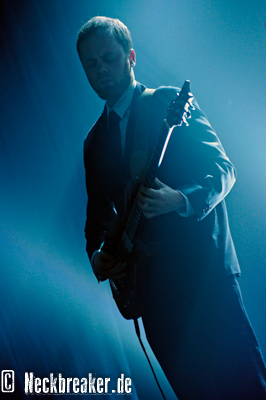 Anne: As this whole story has now come to an end, do you rather feel sad or released that you can now start something else?
Anne: As this whole story has now come to an end, do you rather feel sad or released that you can now start something else?
Jón: Released I think.
Theodor: It’s good.
John: Let’s just do songs now. (all laugh)
Theodor: We’ll probably going to do concepts, but we’re not going to do necessarily a story, anything like … It’s probably going to be a little different, a different approach for the next one.
Anne: As your music is about the hardship of the Faroese people - more or less – does that exclude certain historical happenings?
Jón: It did. All of the stuff that we’ve been doing on these albums has been fictional and we never mentioned names or particular things, so it’s all fictional. It hasn’t really been occurring in the Faroese culture, but it’s some kind of imagining of the Faroese.
Anne: No, I mean: would you say you never write a song about something that really happened?
Jón: Probably in the future, yes. I was thinking about writing about a specific event for the next album. I have talked to Esmar and Theodor about it, but I haven’t talked to you about it, John. It’s basically the ultimate Hamferð [Hamferð means to see somebody for example walking through a village while this person is actually out on the sea and died there, something that has been reported quite often on the Faroes] story to write about this happening in Esmars home town where pretty much all the men and the young boys were killed when they were trying to drive a grind onto the beach. A pretty insane happening. 1914 – no, 1915, so it was 100 years ago like 2 years ago.
Anne: So it’s pretty much the same like in Skarð, were they had three accidents.
Jón: Did they leave even? I think they would use immigration from outside.
Anne: That happened after the first accident, I think, but they had three…
Jón: You mean Sandvík?
Anne: No, I mean Skarð, on Kunoy.
Jón: Oh, yes. Exactly, yes. A lot of villages have died like that, also Blankskáli on Kalsoy, which was left after a landslide. But Sandvík didn’t die, there was immigration from Hvalba.
Esmar: Yes, they have had, although a lot of more people from Hvalba died and there was a terrible storm and waves.
Jón: Yeah, both Hvalba and Sandvík were totally concerned.
Esmar: Yes, I think 14 men died. And none were over 25 I think. A very hard thing, everyone was young.
Jón: Yes, there is also a lot of folklore around it, it’s some Hamferð, so it would be cool to actually write about Hamferð for once.
John: The actual thing.
Jón: The actual thing, yes. So that’s probably going to be put on the next one.
"Especially the last week, everything is crazy."
Anne: Music wise, I think the album is different than the album before, but you got only positive reviews so far I think. Did you get any negative reviews or did you get first reactions from the fans?
Jón: No, not really negative. Some were less praising than others, but…
Theodor: There have been like two or three were the reviewers said it sounds really good and it’s really good but they didn’t really relate to it. But that’s like the worst we had. Especially the last week, everything is crazy. The worst reviews are like 9 out of 10.
Jón: 8 out of 10!
Esmar: Yes, that’s really bad. (laughing)
Jón: We had one that was 13 out of 20.
Theodor: And we had Sweden Rock Magazine who gave us 6 out of 10, with that kind of explanation: Yeah it sounds really good and it’s well played, and you know but I can’t really relate to it. But Sweden Rock is a Swedish Rock/Power Metal kind of a magazine…
Jón: Was that the same guy who interviewed us who reviewed it?
Theodor: I don’t know. Probably.
Jón: I didn’t see that review ever.
Theodor: No, it was a Swedish friend of mine who reads that magazine and he send me a photo. He was reading through the magazine and found us. And it wasn’t a bad review. We, at least I, I was a bit nervous about this record. Because it is a bit different, and it is a bit more esoteric and it sets a little higher demands to the listener and to the reviewer, I think. You have hooklines, you have big choruses and stuff like that. I was pretty nervous to see if people would get what we are trying to do or would it just pass people by until they heard it enough times. Which means a lot of people wouldn’t fall for it. But it seems like the universal, the almost universal, reaction has been great, so apparently people get what we’re trying to do. That’s awesome.
Anne: The next question is again a Jón-question so he has to come back. [he is again in the kitchen]
Theodor: Jón! More Jón questions!
Anne: I think you improved again your singing, did you take lessons?
Jón: No, no. I don’t know. I don’t know if I did anything particularly different this time.
Theodor: You have been touring with another band [Jón has been touring with BARREN EARTH in January 2017].
Jón: Yes, I suppose, just playing has been helping, you know. I’m getting better all the time if I’m able to keep working.
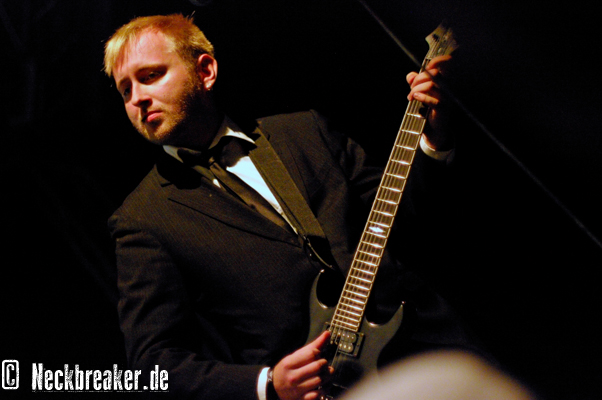 Anne: “Frosthvarv” was played on this Faroese radio show along with other songs where a kind of a jury talked about the songs and they all liked it but some of the listeners said such music shouldn’t be played on the radio. What do you think about that?
Anne: “Frosthvarv” was played on this Faroese radio show along with other songs where a kind of a jury talked about the songs and they all liked it but some of the listeners said such music shouldn’t be played on the radio. What do you think about that?
Theodor: It’s funny I think. I always have the motto that if you’re doing something that everybody likes you’re doing something wrong. It’s not supposed to be easy listening. And Faroese radio it’s…
Jón: … there’s only one channel and it’s one channel for everyone…
Theodor: …and you have these, you know, elderly people and …
John: …boring people, I guess.
Theodor: But you know such people and of course you have an extreme metal song with heavy growls and among the listeners are people that are going to hate it, at least some people. I did an interview with them a few years ago, in a show, what is it called? “Brunch”, where they can take one person, musician or a culture person or a sportsperson or whatever, one person and it’s an one hour long radio show where you discuss and such stuff. And the guy who is in there gets to choose a few songs and I played “New Millennium Cyanide Christ” by MESHUGGAH in the radio in its entire length at like nine in the morning - that was a proud moment! Lots of people hated it, but lots of people loved it as well.
Anne: You played “Stygd” at the Dark Bombastic Evening festival in Romania last year so it was on YouTube in a rather bad quality long before the album was released. Is that a problem for you? Because for example my friends of COMMUNIC, they never play a song live that isn’t released before because they say they don’t want their songs to be out in the world in a bad quality.
Theodor: I can absolutely understand that point of view and I agree with it but at the same time we’ve been holding back these songs for so long and it was time to play something new. We just thought “What the hell, we’re not that big so hopefully people won’t catch on to it and it won’t go viral.” And it didn’t. It’s been up there, but nobody has really reacted to it, so…
John: …and the organizer really wanted new stuff…
Theodor: Yes.
Jón: But, you know, if it works out very well, the sound is good, than it would help with the hype of the album basically.
Theodor: I think the only people who really care about stuff like that, live videos before something is released are the diehard fans who will like it even if it sounds like shit, so I wasn’t too worried about that. And I think when you release a single you’re going to reach people in a different way than when it leaks out.
Anne: Until now, all your covers and artwork was made by Faroese artists, so how did you get in touch with Costin [Chioreanu, a Romanian artist]?
Theodor: Costin got in touch with us. We have a common friend, Jörg Düsedau, our booking agent. And apparently Costin had heard the band, he was a big fan of the band and really wanted to work with us and we are big fans of Costin so it just made a lot of sense.
Jón: And I think the art that he did is incredible. In the Faroes, all the people who are doing artwork and stuff like that are different kinds of artists who aren’t really used to the medium so it’s a lot of work and sometimes hassle to get all in the form that is right.
Theodor: Costin is just…. His art looked awesome and he did this thing because he makes like probably, thirty, forty artworks a year, he’s crazy. So it’s much more efficient.
Jón: Because he does it fulltime, there’s his professionalism over it. That combined with him making awesome art made everything a lot easier this time than it has been with previous artworks.
Esmar: He understood what we wanted and he gave us what we wanted.
"If you’re doing something that everybody likes you’re doing something wrong."
Anne: What I found fascinating is that Costin said that he didn’t google pictures of the Faroe Islands but then he ended up with actual places in his artwork.
Theodor: Well, that is not really true. We send him some nature photos and the cover is one of those photos but he has probably forgotten about it. But there are some other coincidences with the artwork which is more interesting. The dress the female on the cover is wearing, looks very similar to the Faroese national costume for women and I don’t think he had seen that before. We didn’t send him anything like this and he had no idea. And the same with the lyric video for “Hon Syndrast”: There is especially one part of it, which looks like a William Heinesen painting basically. William Heinesen is one of the most famous Faroese treasured artists, it’s a very distinct style. So I asked Costin if he has ever seen anything by William Heinesen and he had no idea who he was. So I send him some links and yes. Super strange. Because the styles are very similar.
Anne: A few days ago, I just saw accidentally a picture on your facebook page from 2016, from Tjørnuvík, so I thought he probably had seen this.
Theodor: Yes, we send that, but he had the presence of mind to make it without Risin and Kellingin [two famous sea stacks]. We were so happy that he did that because otherwise it would look like a tourist photo.
Anne: Do you think you have now reached a point where you have to create artist facebook pages? Because up to now you have just your private facebook pages.
John: No, I don’t think so.
Jón: I don’t think that’s necessary.
Theodor: I mean, we’re getting more and more strange friend requests, but honestly I stopped confirming them.
John: Maybe Jón. Jón is THE VOICE.
Jón: We’re not famous enough I think.
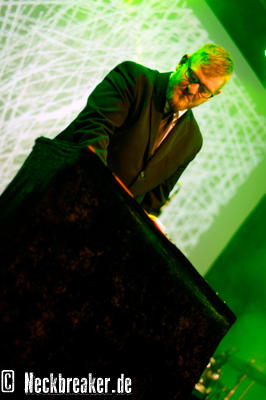 Anne: You are also celebrating the 10th birthday of the band this year. Are you actually celebrating it in a way?
Anne: You are also celebrating the 10th birthday of the band this year. Are you actually celebrating it in a way?
Esmar: This summer is our 10th anniversary.
Jón: We have to do something, but we haven’t really found out what yet. Maybe we just do a party for us, maybe we just hold a… I don’t know.
Theodor: We should do a 10 year anniversary tour and play our old stuff!
Esmar: Both of our old songs!
Jón: Totally. No, that’s not going to happen.
Anne: Yes, that’s my next question: Have you ever thought about rereleasing the demo?
Jón: No.
Theodor: We thought about it, it’s not going to happen. One of the songs…
Esmar: …one of the songs we always play live.
Theodor: Yes, there are two songs, and “Opið Hav” is – yes, that’s history. “Ódn” is one of my favourite songs to play live and I don’t know if we’re going to rerecord that in some way; probably sometime, yes. Because it’s an awesome song, it just needs a proper…
Esmar: … maybe give it a facelift
Theodor: Or we do a good quality live recording.
Esmar: That might be a good idea.
Anne: And the last question is a Jón-question again. As far as I know you changed your last name officially. Why was that important for you, why is it not enough to have it just as a stage name?
Jón: Well, I didn’t change the name so much because of the band. Basically because my name was Hansen and Hansen is totally the most regular name on the Faroes, so there is no particularly special thing about it. But also neither of my parents are called Hansen anymore. They’re married now, but they didn’t take each other’s name or anything. And my dad was called Hansen, my mother is called Andreasen and he had a middle name, which was Meinertsson, from his father and he just removed Hansen and now he is called Meinertsson and my mother is called Andreasen and I was called Hansen, which is like nonsense. And then I didn’t like Hansen, never liked it at all and it only costs 1.000 DKK to change it so I did that.
Anne: So it’s pretty easy to change your name in the Faroes?
Jón: Yes you have to kind of discuss with them to justify it. I wrote an application, with an argument for my name and then they wrote back that they had temporarily denied it because this and that. There was something about they didn’t understand what I was trying to do with the name and they thought it has something to do with waves and then the grammar was incorrect. So I rewrote a kind of a clarification that it didn’t have anything to do with waves then they were fine and approved it.
I’m going to spare our readers the discussion about changing your name in the Faroe Islands, Iceland and Germany which followed this question and in which the interview somehow ended as it was the last question anyway.
A big thank you again to the HAMFERĐ guys who made this interview possible! (Anne)